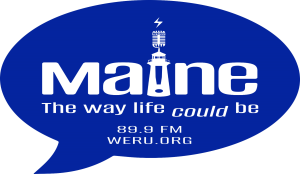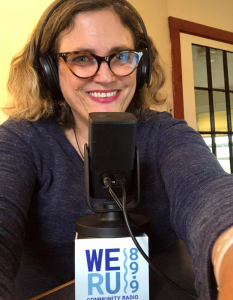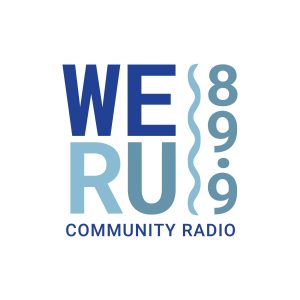
WERU Asked Listeners to Name the Greatest Challenges of the Decades to Come…and Based a Year-Long Series of Community Conversations on Their Answers
In February of 2022, WERU launched Maine: The Way Life Could Be.
Produced and hosted by Jim Campbell, who has been with the station since its 1988 founding, and by News and Public Affairs Manager Amy Browne, the monthly series explores a wide range of local issues—climate change, chemical contamination of the soil, water (fresh and ground), housing, health care and insurance—all through the eyes, ideas and voices of local residents, experts and advocates in their fields, the people of all ages who call Maine home.
On October 13, I spoke with Jim and Amy about the program, its genesis, its design, its impact and its future.
This conversation has been edited for brevity and sequence.

Diane: Thank you, Jim and Amy, for taking the time to talk with me today. Let me start with a little bit of background before we dive in. A couple of months ago, I saw on the station website your descriptions of this series, and it intrigued me because it seems like such a perfect use of community radio, something so well suited to its purposes. The first question then has to be where did this series come from—its design and its community outreach?
Jim: As you drive into Maine, coming up Route 95, there’s a sign that says “Maine, the way life should be.” So, the show got its title taking off from that sign and replacing “should” with “could.” We decided to look ahead at some of the challenges and maybe opportunities in the lives of people who are alive today. That gives a very wide range.
And, then, to try to get a little bit of a sense of what those challenges might be, we put some announcements on the air inviting listeners to call in to a Zoom conversation that wouldn’t be on the air, but just a conversation, to ask people what they thought the big, two big things coming up in their lifetimes would be, and we took those suggestions. We came up with topics based on them.
Amy: And we did end up broadcasting some of that first meeting. We asked what issues and opportunities they were facing in their lifetime. A lot of them wanted to say climate change. A lot of people ended up reverting to their second choice because their first had already been mentioned. So we had them join us and just tell us what they were thinking and use some pieces of that to set off the series. And I think we’ve actually covered them.
Jim: I think it was about 30 people who called in on that Zoom call. So you know, it was significant enough to be different. And it was manageable, which is also great for those kinds of things. And so we really did have an opportunity to hear what people said, and people came off of what somebody else said. And there were people who said, “I came here to go to college in Maine, and I stayed, but I don’t know what I’m gonna do because who the heck can afford to find a place to live? Because I’m working at this or that and I can’t afford that. I have to live 20 miles away.” So, that became one of the topics that we looked at, affordable housing.
Diane: That makes a good transition for my next question. What did the program series reveal?
Amy: A lot of things just connected with each other. One thing I think we did that people might have found particularly useful, even if they were already activists within a particular area, is to talk to some of the experts in the field and also people with lived experience.
For example, with climate change, we ended up doing two parts because we had town managers, town planners, and then also really wanted to talk to some young people because of the perspective that they have of how it’s impacting their lives directly and their plans. I mean, one of the young women said in the program that, though she’d wanted to have children, she’d already decided that she didn’t think that she would because she just thought the future was too precarious. And the young people felt like they were having this problem dumped on them to solve. The other thing that really grabbed my attention was the expectation that we’re going to solve this now. You know, that I would like to do something else with my life but now I’ve got this to work on.
Jim: And climate change is already affecting the fishery—the species are moving to cooler waters—and agriculture. Wild blueberries for example, which have been sort of iconic in Maine, not so clear what’s going to happen when the temperature gets a bit warmer. You know? So, yeah, climate change is a huge issue for a state that has been natural resource-based for most of its existence.
Amy: That came up with almost every topic we had. Maine has a lot of so-called COVID refugees—we had a very low COVID rate–, and we also have climate refugees—as people [have been] calling them—moving into this part of the country. And there are pros and cons of that.
It’s our housing. We have people who fish or work in the working waterfront or who just have regular jobs, and the communities on the coast where they could always afford to live suddenly became very attractive fixer-uppers for people who had a bajillion dollars from a big city and could telecommute now. We had a town manager from Stonington, Maine, say, you know, basically, they don’t even have a school bus that goes through the center of town anymore because almost the whole town shuts down for the winter now. People have bought up all the real estate as summer houses or they’re using them for short-term rentals. And that was kind of repeated throughout the state, that there are communities on the coasts that are becoming gentrified. Even the City of Portland that I grew up in, my family had been in for generations, has become so gentrified that most people who actually were born and raised there within our lifetimes can’t afford to live there anymore. And the same thing is happening within communities here in the mid-coast. So you know, there are questions of what happens to your volunteer firefighter community in response to your fires if they have to live 40 miles away. And you know, if no one who works in town can afford to live in town, what does that do to a town?

Diane: Your program descriptions show that you were careful to line up a wide variety of guests, by age, gender, occupation, background, a lot of diversity. And I wonder how did you find your guests. How did you pull that together?
Jim: Many of the people that we spoke with are people who are already concerned about whatever the topic was.
I think we contacted one or two people who actually spoke on our original call; but, for the most part, we thought about, if we’re on this topic, who could speak to it and perhaps from somewhat different perspectives. We weren’t trying to get a he said/she said kind of thing at all, but much more somebody who might have a different way of looking at things because of their age maybe or because of the particular work they do. So, on the one about work and workforce, we had somebody from the AFL-CIO and we had somebody who used to be the head of the State Economic Forecasting Unit here in Maine.
Diane: And can you talk to me a little bit about what the demographics are in your listening area?
Jim: Our signal covers a 30 to 40 mile radius. There’s Bangor, the third largest city in Maine, and we cover that. But we don’t cover the southern area over the air, which is the part that’s closer to Boston and is more densely populated and more racially diverse. On the other hand, we do cover the area where the Penobscot Nation has their reservation, quote, unquote; and we do cover a lot of the mid-coast area which has got a lot of waterfront type businesses and activities and also is a big area for tourism. So there’s a lot of people who are working in industries that depend on tourism. As far as the demographics, I don’t think it’s much different from the rest of the state. Maine is the oldest state in the Union both by the percentage of people over 65 and by the median age of the population.
Amy: And also the whitest state in the country.
Jim: Yeah, yeah. There used to be a big Air Force base in Maine, and there used to be a big Air Naval Station; and, when those were active, we actually had more minorities from the service people. Now, in the last probably eight to ten years, Catholic Charities has been very active in Maine, in settling refugees. We have now quite a lot of people from Somalia and Ethiopia, and so that has lowered our percentage of whiteness, but not enough to make us the second most white state.
Amy: A lot of the things that we were talking about were in flux. The State Demographer had just published a study of what the demographics had been, but they already were saying, ‘We don’t know. We put this out with numbers from right before the pandemic, and now we have no idea how that’s going to change things.’
Diane: You’re about to air your eighth program. So, I’m wondering what have been the community reactions, the listener reactions?
Jim: Well, we don’t have any official statistical sampling. So, we just hear from people who make it a point to say if they have something to say. And to the best of my knowledge, none of those anecdotal comments have been critical.
Most everything we’ve talked about is something that is really on people’s minds. And we’ve perhaps had the opportunity to amplify that somewhat to people who might not have been thinking about doing something about it.
Amy: I’m on the Program Committee, so I review all the incoming comments. They’ve only been positive. Usually, we’ll hear from people if they’re unhappy, which fortunately doesn’t happen that often, but all the comments that we have received have been positive.
Diane: You have two programs left. Can you tell me what they will be about?
Amy: For the next one we are trying to get together some people under 40. The station has really tried to do outreach to people under 40 to get them more involved with the station because the demographics of those of us who work in the station skews older. You know, a lot of younger people are like, ‘What’s a radio?’…so what we’re hoping to do, and we’re just working on it now for the next program for November, is to get some of the people from that demographic and ask them about these topics that we’ve talked about over the year, ask what they think about them now. And then the final one, we’re just going to invite as many people as possible to come back in or to join us like the first one.
Jim: It’ll be the grand finale.
Diane: And come next year?
Amy: We put this in a time slot that normally a program I host called Maine Currents was in. So the plan is, after the end of the year, to swap that back and maybe cover some of these kinds of things.
The newest episode of Maine: The Way Life Could Be aired on WERU on Tuesday, November 1.
This program was made possible in part by a grant from the Maine Arts Commission.
The entire series is archived on WERU’s website.
